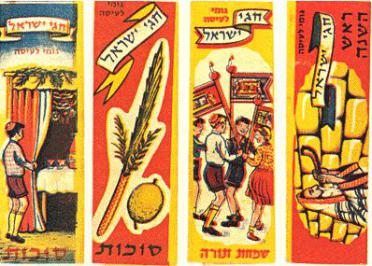Every week, parshaoftheweek.com brings you a rich selection of material on parshat hashavua, the weekly portion traditionally read in synagogues all over the world. Using both classic and contemporary material, we take a look at these portions in a fresh way, relating them to both ancient Jewish concerns as well as cutting-edge modern issues and topics. We also bring you material on the Jewish holidays, as well as insights into life cycle rituals and events...
I'd like to share with you a thought for the holiday.
One of the best known sections of the Haggadah is the discussion of the four sons: the wise, the wicked, the simple, and he who is unable to even ask a question. One of the questions often asked about this section is about the order: why is it presented in this way, from the wise son down to the non-asker? One answer sees the four sons as actually one individual, and understands this section as a recapitulation of the growth and development of each and every one of us, from unengaged toddler, to unfocused but inquisitive child, to rebellious adolescent and, finally, hopefully, maturing into a wise young adult. The order is reversed so that we can tell the story from its happy ending - the wise son - and then move back in time, to recall the stages of our development.
One can tweak this idea, and view these different personalities not as developmental, but, rather, as co-existing in each and every one of us. The Haggadah starts with the wise, focused, empathetic, engaged questioner, the person who asks intelligently and creatively because he cares and identifies deeply; this is the person we would all like to be. We then admit that there are times or situations in which we feel angry, disturbed and distanced by our people, their actions and their traditions, and attack, rather than discuss, what the Jews are doing. At other times we are too tired, or lazy, or uninspired, to ask anything more than a simple question, hoping, at best, for a simple, superficial answer. Interestingly, this form of almost mechanical semi-engagement would seem to be worse than the anger felt by the evil son, who cares enough to fight. And then, last and worst, there are times when we are so alienated from Jewish life and tradition that we really don't care enough to ask, engage, question, at all.
The Haggadah has responses for all four of these attitudes. I wish for all of us, in whatever one of these states we happen to find ourselves, whatever kind of son or daughter we might happen to be at any particular time, that we always find those people - parents, teachers, friends, spouses - who can respond creatively and helpfully to us. And, alternatively, when faced with one of these questioners, or with someone too alienated to even ask the question, we can perhaps find the words which will help them on their way, supply the response that will begin to answer their questions, whether actually asked or not.
Pessach kasher v'sameach,
Shimon



Get inspired by Pesach Divrei Torah from previous years